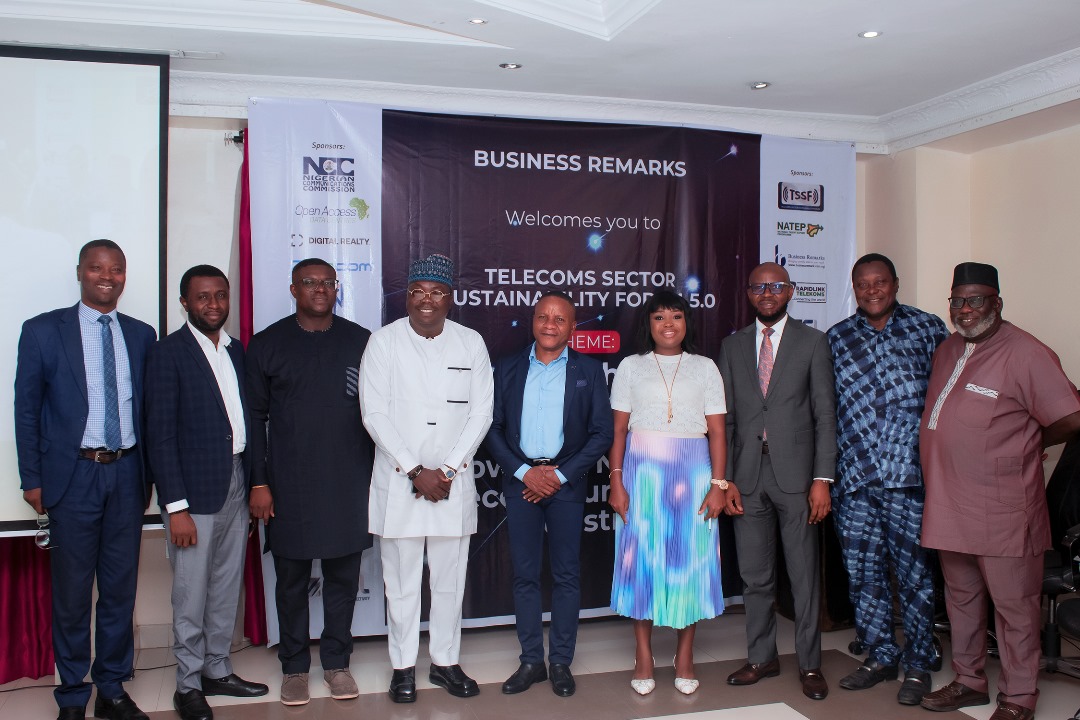Telecom
Brain Drain: NCC Tasks Telcos to Partner Academia to Groom Telecom Talents

In an effort to bridge the skills gap and curb brain drain in the Nigerian telecom sector, the Nigerian Communications Commission (NCC) has tasked telcos with industry-academia collaboration.

Dr Aminu Maida, executive vice chairman of the commission, who made this call in Lagos as the keynote speaker, also urged telecom companies to adopt flexible work policies, better renumerations and foster a culture of innovation to create an environment that attract and retains talents.
Speaking at the Fifth Edition of the Telecom Sector Sustainability Forum (TSSF 5.0) organised by Business Remarks themed “Mitigating the Effects of Talent Exodus and its Impact on the Growth of Nigeria’s Telecommunications Industry”, Maida who was represented by the NCC Lagos Zonal Controller, Mr Tunji Jimoh said talent is the lifeblood of innovation and development, and the loss of skilled professionals is a major setback for our industry.
According to him, the global demand for tech talent has driven a good number of Nigeria’s brightest minds to pursue lucrative opportunities abroad, leaving vacuums in the industry skills gap that potentially can threaten the sustainability of the telecoms sector.
Quoting the report from the Association of Telecoms Companies of Nigeria (ATCON), Maida noted that over 500 software engineers and more than 2,000 trained telecom professionals left the country in 2022 alone. This trend, if left unchecked, could jeopardize the growth and sustainability of the industry.
Speaking on measures to mitigate brain drain and address talent exodus in the telecom sector, the EVC said, professionals, especially in the tech sector, seek environments where they feel valued, engaged, and given the freedom to explore new ideas. Offering remote work options, continuous learning opportunities, and collaborative spaces where creativity is encouraged will make the local telecom sector more appealing to professionals who might otherwise seek opportunities abroad.
He emphasized the need for telecom companies to continue to invest in the regular upskilling and reskilling initiatives for their existing workforce.
By offering employees opportunities for professional development, companies not only enhance their workforce’s competencies but also provide incentives for talent to stay, knowing they have a pathway to career advancement within their current organization, he said.
Furthermore, Maida called for the need to ensure a steady flow of skilled professionals. He tasked the telecom sector and companies to actively engage and partner with universities, technical schools, and training institutes to create tailored programs designed to equip graduates with industry-relevant skills.
According to him, this strategy will not only help fill the talent gap but also foster a pipeline of young, ambitious professionals eager to build their careers within Nigeria. Internships, apprenticeships, and industry-sponsored research projects can be a practical way for telecom operators to integrate students and recent graduates into the workforce, ensuring they have the competencies required to thrive in the sector.
The EVC Boss tasked telcos on Industry-wide mentorship programs, where seasoned professionals can guide younger talent. Maida noted this would be an effective way to encourage the transfer of skills and knowledge.
Additionally, telecom companies can collaborate on initiatives like tech hubs, start-up incubators, and innovation challenges to not only cultivate local talent but also to provide platforms for professionals to showcase their skills and stay motivated within the industry.
Adopt cutting-edge technologies like 5G, AI, and IoT to create an exciting and innovative environment for professionals. Invest in R&D and support entrepreneurship in the telecommunications space to create an environment where Nigerian professionals can pioneer new technologies, rather than having to seek these opportunities elsewhere. This is, because, the telecoms sector thrives on innovation, and one way to retain talent is by fostering a forward-thinking, technology-driven environment, he stressed.
On part of the commission, the NCC Boss said that the commission has been instrumental in mitigating talent migration through its initiatives to promote indigenous content, improve infrastructure, and create an enabling environment for digital growth. The NCC’s collaboration with stakeholders, MDAs, state governments, and international agencies has been crucial in achieving these goals.
According to him, the 3 Million Technical Talent (3MTT) Program, launched by the Ministry of Communications, Innovation, and Digital Economy, aims to train 3 million Nigerians in digital and technical skills by 2027. The NCC is actively participating in this program by supporting participants with training devices.
Additionally, the NCC’s partnership with Nokia to provide a 4G/5G test lab will equip young Nigerians with the skills required for the industry. The NCC is also committed to promoting the development and adoption of indigenous content through the Nigeria Office for Developing Indigenous Content for Telecoms Sector (NODITS), he said.
By pooling resources, the telecom sector can create an ecosystem that nurtures talent at all stages, from entry-level to experienced professionals, and aligns with global standards, the EVC highlighted.
In her welcome address, TSSF 5.0 Convener who also doubles as the Managing Editor of Business Remarks, Bukola Olanrewaju stated that human capital flight, the exodus of skilled professionals from their home countries, has become a global phenomenon with far-reaching implications.
According to her, human capital flight is not merely a statistic; for the telecom industry, it poses significant challenges such as a tangible loss of talent, brain drain, diminished innovation, and intellectual capital. It erodes the very fabric of the industry, leaving behind a void that is difficult to fill. The consequences are farreaching, from weakened competitiveness to a diminished capacity for research and development.
While quoting an analysis from PwC that revealed the talent exodus trend is projected to result in a potential loss of $4.7 billion in productivity and tax revenue for the Nigerian economy by 2027, Olanrewaju noted that amidst the challenges, there lies an opportunity for transformation.
“By addressing the underlying factors that drive the huge depletion in its talent workforce -the severe brain drain, and by fostering a conducive environment for talent development and retention, we can mitigate the effects of this to create a more sustainable, attractive, resilience and prosperous industry.
These facts stress the need to invest in talent development and retention, foster a supportive work environment, and offer competitive compensation and benefits”, Olanrewaju said.
Telecom
MTN Group Announces Proposed Full Acquisition of IHS Towers

MTN Group has revealed that the board of IHS Towers accepted its offer of US$8.50 per share, positioning MTN to boost its stake to 100% ownership following IHS’s divestment of Latin American assets.

MTN Group
The potential transaction is subject to various approvals and the delisting of IHS from the New York Stock Exchange (NYSE).
Upon the completion of IHS’s announced disposals (on 11 February and 17 February 2026) of its Latin American assets, it is intended that MTN will acquire 100% of IHS’s remaining business.
IHS is one of the world’s largest tower companies, with nearly 29 000 high-quality towers in Africa serving various mobile network operators in five key MTN markets.
The proposed transaction, which follows discussions noted on 5 February 2026, marks an important step to unlock compelling value for MTN and strengthen and
reintegrate its ownership of critical digital infrastructure across Africa. For IHS shareholders, it provides them with an attractive opportunity to crystallise value.
The funding for the proposed transaction of the remaining shares MTN does not already own, for a consideration of some US$2.2 billion, will be through cash of
approximately US$1.1 billion on IHS’s balance sheet, along with available liquidity and debt from MTN.
MTN has approximately 24.7% shareholding in IHS. As part of the transaction, it intends to take the company private through the acquisition of all outstanding
shares it does not own, pursuant to a cash merger.
By reintegrating the tower assets, MTN will be able to internalise the margin currently paid to IHS, benefit from current and future incremental third-party
revenues, improve cost predictability and unlock significant long-term value embedded in its existing investment.
“This proposed transaction is a pivotal step in further strengthening MTN Group’s strategic and financial position for a future where digital infrastructure will become ever more essential to Africa’s growth and development,” said MTN Group President and CEO Ralph Mupita.
“This transaction gives us a unique opportunity to buy back our towers and strengthen our ability to be partners for progress to the nation states in which we operate.”
“For IHS customers and partners across the continent, we commit to continuing high standards of service and the right governance of what is the largest standalone and
integrated tower company in Africa, enabled by the excellent people within IHS.”
Through this transaction, shareholders of IHS will receive US$8.50 per share. This translates to an 9.7% premium to the 30-day volume-weighted average price as at
4 February 2026 (the last day of trading before the release of MTN’s cautionary announcement) on the NYSE, enabling them to unlock the value of their investment.
Long-term IHS shareholder Wendel has provided a letter of support to vote in favour of the transaction and will receive full liquidity on its shares upon closing.
With support from Wendel (and certain affiliates) and MTN being able to vote at a general meeting, ~40% has already been secured of a minimum two-thirds approval
of voting shareholders.
IHS Chairman and CEO Sam Dawish commented: “The proposed transaction deepens our long-standing partnership with MTN as it combines Africa’s largest
mobile network operator with one of its largest digital infrastructure platforms and underscores the strong connection between IHS Towers and the African continent.”
In structuring this transaction, MTN remains focused on disciplined capital allocation inclusive of shareholder remuneration going forward. No new equity issuance will be required at the MTN Group level and the funding plan allows for a short-term increase in leverage. The transaction is forecast to be accretive to net income and cash flow.
The proposed transaction is subject to IHS shareholder approval, regulatory approvals in the relevant markets and customary closing conditions.
Telecom
MTN, BUA, Dangote & Other Industry Giants Triumph at NGX Made of Africa Awards

Nigerian Exchange Group (NGX) hosted its annual Made of Africa (MOA) 2025 Awards on Monday, February 4, 2026. The event, held during the NGX year-end celebrations, brought together regulators, listed companies, and market operators such as MTN, BUA, Dangote, Transcorp, to celebrate achievements in compliance, sustainability, and market performance.

In his opening remarks, Dr. Umaru Kwairanga, the Chairman of Nigerian Exchange Limited, said “Excellence in compliance, sustainability, and several other categories recognises the fact that capital market operators and quoted companies must be standards not only in terms of the size of their operations but also adherence to regulations and best practices of corporate social responsibilities.”
He emphasised that the awards serve as a benchmark for excellence. He noted that the 2025 honourees demonstrated significant improvements in branding, customer service, and operational standards despite a challenging economic environment in Nigeria.
Among the evening’s significant winners was MTN Nigeria, which was honoured for its commitment to corporate transparency. The technology giant received the award for Leadership in Sustainability Reporting, emerging as the winner in a category that included Seplat Energy, BUA Cement, and Transnational Corporation of Nigeria PLC.
The award recognised the brand’s adherence to both national and global reporting standards, reflecting its role in advancing environmental, social, and governance (ESG) practices within the Nigerian corporate space.
Tobe Okigbo, Chief Corporate Services & Sustainability Officer, MTN Nigeria, said “This recognition for Leadership in Sustainability Reporting underscores our commitment to transparency and aligning with global best practices.
“As the capital market moves toward greater accountability, MTN Nigeria remains dedicated to demonstrating resilience and faith in the Nigerian economy through comprehensive and standard-compliant reporting.”
The ceremony saw several other major players in the financial sector secure multiple accolades. Chapel Hill Denham emerged as one of the night’s most successful firms, winning in categories including Fund Manager with the Largest Listed Fund Size and Market Operator with the Highest Value of Foreign Portfolio Investment (FPI) Transactions.
Other notable winners included: Cardinal Stone Securities Limited, named Broker of the Year and Equity Trader of the Year, Dangote Cement was awarded Best Issuer in terms of Fixed Income Listings, BUA Cement PLC was recognised as the Most Compliant Listed Company, and Transnational Corporation of Nigeria (Transcorp) PLC received special recognition for Capital Market Excellence in Equity.
Mr. Jude Chiemeka, the Chief Executive Officer of Nigerian Exchange Limited, congratulated the recipients, noting that the market saw a 51% close in the All-Share Index last year, making it the second-best performing market globally. He urged winners and nominees alike to continue striving for excellence to further the aspiration of a $1 trillion Nigerian economy.
Telecom
4G Dominates Nigeria’s Broadband as 5G Lags Behind

Nigeria’s broadband landscape remains anchored by 4G LTE at 52.95% market share in December 2025, with 2G holding steady at 37.37%, while 5G penetration crawls at just 3.77%, per Nigerian Communications Commission (NCC) data.

4G’s dominance stems from urban smartphone migrations and MTN-Airtel infrastructure expansions, fuelling the digital economy, as 2G persists in rural areas due to feature phone reliance and a stubborn device gap.
5G growth stalls from high smartphone costs amid inflation, telco preference for 4G’s quicker returns over capital-heavy 5G rollouts, and limited mainstream apps beyond elite urban streaming in Lagos and Abuja.
Broadband subscriptions topped 112 million, lifting penetration to 51.97%—up from 42.2% in October 2024—crossing the halfway mark for the first time, though monthly gains of 2-3 million slowed mid-year amid population growth and regional disparities.
The NCC’s 70% target stays elusive, highlighting sustained urban-rural demand but underscoring needs for affordable devices, infrastructure, and use cases to accelerate high-speed access nationwide.

 General News2 days ago
General News2 days agoJumia Targets Break-even in 2026 After Strong Q4 Surge

 General News2 days ago
General News2 days agoNigeria’s Banks Race to Meet CBN Recapitalisation Deadline Amid Verification Push

 General News2 days ago
General News2 days agoBOI, MTN Foundation Unveil N1Bn Fund for Women Entrepreneurs

 General News1 day ago
General News1 day agoUBA Unveils Diaspora Platform to Connect Global Africans with Investment, Wealth Opportunities

 E-Financial2 days ago
E-Financial2 days agoNo VAT on Land, Buildings and Rent Under New Tax Law — Oyedele

 E-Financial2 days ago
E-Financial2 days agoCBN Slams Up to N10m Fine on Banks and Cheque Printers for Security Breaches

 E-Financial2 days ago
E-Financial2 days agoIs Nigeria Borrowing to Survive or to Build?

 General News1 day ago
General News1 day agoLeo Stan Ekeh Foundation, Zinox Group To Invest 10B on 1000 University Tech Scholarships for Indigent Nigeria Wiz-kids


























